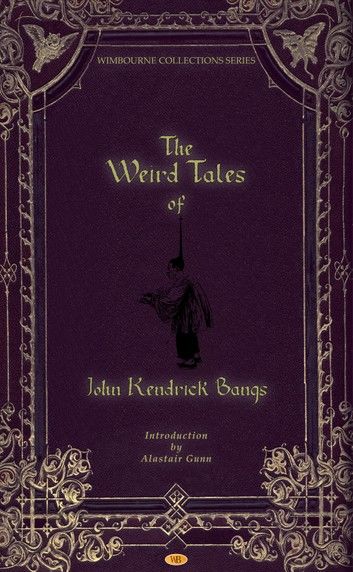| FindBook |
有 1 項符合
The Weird Tales of John Kendrick Bangs的圖書 |
 |
The Weird Tales of John Kendrick Bangs 作者:John Kendrick Bangs 出版社:Wimbourne Books 出版日期:2017-09-22 語言:英文 |
| 圖書館借閱 |
| 國家圖書館 | 全國圖書書目資訊網 | 國立公共資訊圖書館 | 電子書服務平台 | MetaCat 跨館整合查詢 |
| 臺北市立圖書館 | 新北市立圖書館 | 基隆市公共圖書館 | 桃園市立圖書館 | 新竹縣公共圖書館 |
| 苗栗縣立圖書館 | 臺中市立圖書館 | 彰化縣公共圖書館 | 南投縣文化局 | 雲林縣公共圖書館 |
| 嘉義縣圖書館 | 臺南市立圖書館 | 高雄市立圖書館 | 屏東縣公共圖書館 | 宜蘭縣公共圖書館 |
| 花蓮縣文化局 | 臺東縣文化處 |
|
|
This first publication in the Wimbourne Collections series concerns the weird, supernatural and ghostly stories of John Kendrick Bangs (1862-1922). For the first time in print, twenty-seven of Bangs' supernatural and strange stories have been collected together; taken from his collections "The Water Ghost and Others" (1894), "Ghosts I Have Met and Some Others" (1898) and "Over the Plum-Pudding" (1901). These stories are a welcome and refreshing component of the genre of Victorian weird fiction. Some are about ghosts, some about fairies, one is about time-travel, many are satirical; but they are all 'weird tales'.
Bangs was an American author, satirist, humourist, editor and lecturer, descended from the Methodist pilgrim stock of New England. Born in Yonkers, New York, he graduated from Columbia College in 1883 where he studied Political Science. Although destined to follow a career in law, Bangs soon followed his interests as a writer (which he had demonstrated as editor and contributor to the college magazine Acta Columbiana). He became a staff member for the newly-incorporated Life magazine, initially writing much of its comic content. After four years as associate editor at Life he took charge of the Department of Humor for the distinguished publishing house Harper & Brothers. Here he became associate editor of Harper’s Magazine and by 1889 was Editor-in-Chief of Harper’s Weekly. He also contributed the other Harper’s journals; Harper’s Bazaar and Harper’s Young People. He wrote outside of Harper’s too, being one of only a handful of American satirists invited to contribute to London’s Punch magazine. Bangs produced over sixty volumes during his lifetime. His most successful book was A House-Boat on the Styx (1896), a kind of literary experiment concerning a group of famous people, in a social club, holed up on a boat on the River Hades. Bangs’ style of writing, with fantastical depictions of famous people in the afterlife, in this book and its sequels (The Pursuit of the House-Boat; 1897, and The Enchanted Typewriter; 1899), gave rise to the term ‘Bangsian’. He also wrote satirically about politics in Three Weeks in Politics (1894), an account of his experiences running for mayor of Yonkers, and dabbled in biography with Napoleon, Mr. Bonaparte of Corsica (1895). Other important Bangs works were A Rebellious Heroine, (1896) and Paste Jewels (1897). After 1905 Bangs turned mainly to lecturing and many critics have claimed his anecdotal work From Pillar to Post; Leaves from a Lecturer's Note-Book (1916) as his most accomplished work. John Kendrick Bangs died on 21st January 1922 in Atlantic City, soon after being operated on for intestinal cancer, and was interred at Greenwood Cemetery, Brooklyn.
|










